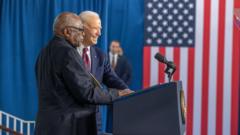The Dutch coalition, formed just under a year ago, has crumbled after the far-right leader's demands sparked political turmoil.
**Dutch Government Faces Crisis as Far-Right Leader Exits Coalition**

**Dutch Government Faces Crisis as Far-Right Leader Exits Coalition**
The resignation of Prime Minister Dick Schoof follows Geert Wilders' withdrawal over migration disputes.
The political landscape of the Netherlands has been significantly reshaped as Prime Minister Dick Schoof announced the collapse of his government following the unexpected exit of Geert Wilders, the leader of the far-right Freedom Party (PVV). This dramatic turn of events comes in the wake of escalating disputes over migration policies, which have been a focal point of Wilders' political agenda.
In a televised address, Schoof voiced his disappointment over Wilders’ decision, labeling it "irresponsible and unnecessary." He had sought to maintain coalition unity, but a last-minute emergency meeting on Tuesday morning, intended to address Wilders’ contentious proposals for asylum reforms, ended abruptly when the PVV leader walked out. "No signature for our asylum plans. PVV leaves the coalition," Wilders proclaimed on social media platform X.
The coalition, which had struggled to implement its policies since forming in July 2024, was a precarious partnership involving the PVV, the conservative-liberal VVD, the Farmers' Citizen Movement (BBB), and the new centrist party New Social Contract. Tensions had been palpable since its inception, as infighting and opposing views on key issues became evident.
Political reactions to Wilders' exit have been swift, with leaders from rival parties expressing disbelief and anger. VVD leader Dilan Yesilgoz termed the move "super irresponsible," while Deputy Prime Minister Mona Keijzer from the BBB accused Wilders of betraying the nation. In contrast, Wilders appeared resolute about his political future, asserting that he aims to lead the Netherlands as prime minister during the next elections, which could be scheduled for autumn.
Economic analysts, including ABN AMRO bank's chief economist Sandra Phlippen, suggest that the immediate economic implications of the government’s collapse might be limited, considering the coalition’s ineffective governance during its short tenure. Nonetheless, the instability has the potential to disrupt the political climate further, particularly with the upcoming NATO summit in The Hague casting a shadow over the political turmoil.
As a prominent figure on the far-right, Wilders’ actions are perceived as an attempt to bolster his party's standing amidst declining support in the polls. However, the strategic gamble of prioritizing personal ambitions over governmental stability could pose challenges in forming future alliances, particularly as migration issues become central to his campaign strategy.
This political crisis highlights the fragility of coalition governments and raises questions about the future of far-right politics in the Netherlands and Europe as a whole. With the nuances of asylum and immigration policies now at the forefront, Dutch voters are likely to see a heightened emphasis on these issues in upcoming electoral debates.
In a televised address, Schoof voiced his disappointment over Wilders’ decision, labeling it "irresponsible and unnecessary." He had sought to maintain coalition unity, but a last-minute emergency meeting on Tuesday morning, intended to address Wilders’ contentious proposals for asylum reforms, ended abruptly when the PVV leader walked out. "No signature for our asylum plans. PVV leaves the coalition," Wilders proclaimed on social media platform X.
The coalition, which had struggled to implement its policies since forming in July 2024, was a precarious partnership involving the PVV, the conservative-liberal VVD, the Farmers' Citizen Movement (BBB), and the new centrist party New Social Contract. Tensions had been palpable since its inception, as infighting and opposing views on key issues became evident.
Political reactions to Wilders' exit have been swift, with leaders from rival parties expressing disbelief and anger. VVD leader Dilan Yesilgoz termed the move "super irresponsible," while Deputy Prime Minister Mona Keijzer from the BBB accused Wilders of betraying the nation. In contrast, Wilders appeared resolute about his political future, asserting that he aims to lead the Netherlands as prime minister during the next elections, which could be scheduled for autumn.
Economic analysts, including ABN AMRO bank's chief economist Sandra Phlippen, suggest that the immediate economic implications of the government’s collapse might be limited, considering the coalition’s ineffective governance during its short tenure. Nonetheless, the instability has the potential to disrupt the political climate further, particularly with the upcoming NATO summit in The Hague casting a shadow over the political turmoil.
As a prominent figure on the far-right, Wilders’ actions are perceived as an attempt to bolster his party's standing amidst declining support in the polls. However, the strategic gamble of prioritizing personal ambitions over governmental stability could pose challenges in forming future alliances, particularly as migration issues become central to his campaign strategy.
This political crisis highlights the fragility of coalition governments and raises questions about the future of far-right politics in the Netherlands and Europe as a whole. With the nuances of asylum and immigration policies now at the forefront, Dutch voters are likely to see a heightened emphasis on these issues in upcoming electoral debates.





















